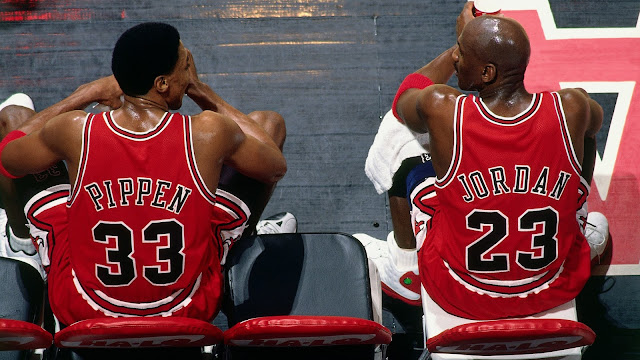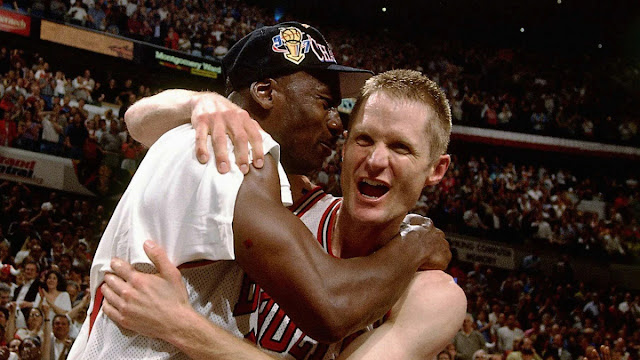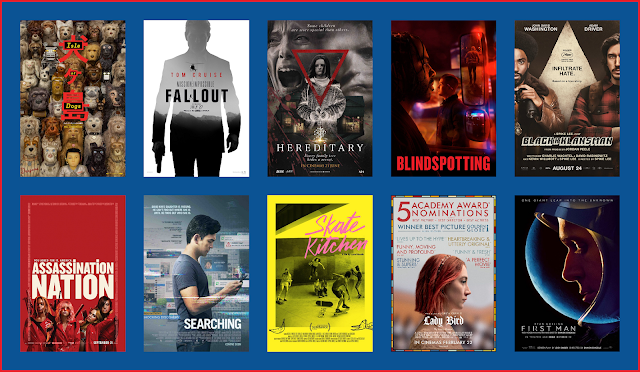The Last Dance Review
(A version of this article originally appeared on kernelnow.com / mynewslike.com)
 |
| Great Scottie: Jordan rules in this documentary, but not without deference to his star team-mates (source: Andy Hayt/NBAE) |
There was a tweet that came out during the release of The Last Dance that said “someone tell Michael Jordan the coronavirus said it was better than him”. To some, it may be borderline sacrilegious to associate the glorious era of “His Royal Airness” with one of global woe, but whilst that comment is obviously drenched in fantasy it also carries with it an air of inevitability.
If there was a way for Michael Jordan to take on a global pandemic, he probably would find a way to win.
The Last Dance is a ten-episode docu-series produced by ESPN and Netflix, examining the legacy of Jordan and the Chicago Bulls dynasty who dominated the NBA throughout the 1990s. In meticulous detail, nearly every year and player is cross-examined, leading through the conclusion of the 1997-98 season which proved the team’s last. As the series diverges between the past and present of that final year, an astonishing level of camera access brings to light the events and emotions that this incredible team and its superstar both enjoyed, and endured.
Guiding us through this journey is Jordan himself, perennially nursing a whiskey and a cigar (as if on the world’s greatest victory lap) and sitting as a reminder that for all the background players and sub plots to come, this is his story. How much you can stomach that may depend largely on your views on MJ as the anchor for this team, but for this story Jordan is, for better or worse, the undisputed commander-in-chief.
 |
| It’s worth noting that that’s not Jordan’s actual house, and that his entire earnings from this release are going straight to charity (source: Backgrid UK/Best Image) |
There may never have been a greater basketball player than Jordan, but there certainly has never been one more competitive. Those two characteristics are what shine through most in this documentary, and Jordan holds no illusions about shying away from either. The former – the talent – is a matter of fact, as a rolling clip-show of his super-human abilities and accolades can attest. But the latter – the drive to win – is documented just as thoroughly; the only thing more intimidating than how easily he was able to pinpoint and terrorise another player to enhance his performance on a nightly basis, is just how many accounts there are of his dominance. Sometimes, it’s an opponent who recalls being on the receiving end of his athletic demands, often in the game’s highest competitive stage of the NBA playoffs; other times, it’s a member of his own team recounting his aggression in a practice game. Not once does Jordan deny the truth of these tales.
Some may find his unapologetic stance frustrating, but we’re regularly shown that that isn’t who he was – or is. And yet somehow, Jordan’s confidence rarely descends into cockiness. Perhaps that’s because of an intelligence for and understanding of the game of basketball, or an awareness of his place within it. His respect for his sport, his quest for greatness and his debt to his fans transcends any one player – including himself – and though he remains a master of self-promotion, Jordan never becomes a self-parody. Frankly, he’s equally as honest about his legacy as any of the (sporting) headlines written about him, and it is that honesty which births the true talking points of this series.
Scandal and lore followed this team just as freely as did legions of fans and press, and The Last Dance does not shy away from any of it. These moments are instead embraced, edited into the story like fables to the legend, and just as these hardships did not defeat Jordan and his allies they do not overwhelm the narrative. Woven into the journey in a way that fosters the bond of the team and the connection to the viewer, these raw and personal moments allow moments of triumph to become immediately career-defining.
 |
| Steve
Kerr became one of Jordan’s most successful team-mates, though not
before a physical altercation during a Bulls practice session (source: NBA.com) |
Take, for example, Steve Kerr, entirely honest about being one of the Bulls’ many “role players”, interviewed regularly throughout the series but who doesn’t get his own story told until late on. However, Kerr (whose ever-present Golden State Warriors shirt shows that there was success to be found after Jordan) isn’t a victim of oversight, as his moment comes right where it should within the overarching legend: just as we learn that his father suffered a similar fate to James Jordan, he sinks a Jordan-infused game-winning shot late in the season to keep the Bulls’ hopes alive. This is just one of many sequences designed to offset any complaints over all roads leading back to Michael – when the playoffs hit Father’s Day or when the weight of his legend causes Jordan to literally “break”, the marriage between career and real-life makes the audience subject to the rare sports documentary tearjerker.
These Chicago Bulls influenced culture more than perhaps any other sports team in history, with producer Nina Krstic being just one of many who was “never a huge basketball fan, but .. a huge Bulls fan.” The team led the league not just literally but culturally through the ever-changing nineties, and their charge into the modern era of televisual globalisation is clear through the astonishing, ahead-of-its-time cinematography the documentary boasts. However, an ocean of digestible social context is provided by the likes of journalist Sam Smith (Chicago Tribune) and author Todd Boyd (Young, Black, Rich and Famous), particularly in a superb Chapter V that investigates the team’s role in defining Americana for so much of the decade. Of course, these deep dives are useful not just to provide insight but in complementing impact quotes, such as Horace Grant’s dismissal of the ’91 Detroit Pistons as “straight-up bitches”.
 |
| Obama is not the only former President to offer insight here, and the titles used to introduce them were of some debate (source: ESPN) |
At some point, nearly all of Jordan’s team-mates sit in front of the camera, right down to background players like Cartwright and Wennington (the Chicago Bills, if you will). Obviously, the more notable names are focussed upon within entire episodes: Dennis Rodman constantly treads the line of self-awareness in Chapter III, like the basketball equivalent of The Truman Show; in the next episode, coach Phil Jackson offers calm wisdom, commanding quiet respect and anointing the season as The Last Dance; and there’s the steady-spoken assuredness of Scottie Pippen from Chapter II onwards, who resists wielding a bitter reflection over the fact that he never really emerged as the NBA’s biggest star. There have been criticisms that these players don’t get the same complete or fair depiction that Jordan does, but every single contribution and interview expands the prestige story being told.
Clearly, in this production, elite skills are present off-screen as much as on it. Undoubtedly demanded by the perfectionist Jordan having final cut over the story, to tell this story a team as all-star as that which bedrocked the greatest basketball player of all time was required. They’re led by director Jason Hehir, who never shies away from asking the hard questions of his imposing star, or wrangling insight from the aloof Rodman. His Scottie Pippen comes in the form of producer Krstic, fresh from another long-form sports docu-series O.J.: Made in America and whose experience shows that like many of the records that this super-team toppled in their championship runs, it helps to have a precedent on which to build. Finally, there is the editing team of Chad Beck, Devin Concannon, Abhay Sofsky and Ben Sozanski who refined 500 hours of raw footage into accessible 50-minute chapters, without missing a beat from a story that takes place well over a decade.
 |
| Jason Hehir (right) and his team never shied away from Jordan or any of his stories (source: Jason Hehir) |
The biggest problem and controversy within The Last Dance comes from its realization of the franchise’s most contestable figure, general manager Jerry Krause. Introduced in the opening of Chapter I as the villain of the piece, the question of whether or not he is actually a bad guy is one the series constantly wrestles with, likely complicated by the late executive being unable to defend himself. Certainly, he does not sit as a “team player” like the rest of the organisation and going toe-to-toe with the unforgiving Jordan was arguably a task the diminutive figure was not up to, but it cannot be denied that his rash, very public decision-making was very likely influenced by the constant alienation he received from, at times, the entire team. Many have taken umbrage with their on-screen portrayals, but not one offers the same complexities as Krause.
To borrow from another iconic slice of nineties media, The Big Lewbowski, “Sometimes, there’s a man… well, he’s the man for his time and place”; truly, in his era, and within the history of basketball, Michael Jordan was that man. This is possibly the greatest sports documentary of all time, chiefly focused on possibly the greatest sports person of all time. It would never really be enough to simply show Jordan and the Bulls winning. Their success is a matter of historical fact, and like the opening pre-season Parisian tournament a simple exhibition could never showcase their true identity. Instead, an immersive study is needed, and The Last Dance is exactly that, showing that whilst what Jordan and his few all-time peers have cannot be replicated, it can be examined.
 |
| Of
course, this image truly does not do justice to the number of trophies
that Jackson, Jordan and Pippen (centre-right) won together (source: Andrew D. Bernstein/NBAE) |
It’s very easy to speak sensationally on such a subject, but in the case of Michael Jordan and the Chicago Bulls, hyperbole rarely ever seems like overstatement. It seems only fair to conclude in that dramatic spirit, and to say that for Michael Jordan, the Chicago Bulls and now The Last Dance, no accolade will ever truly suffice – the latest example being the star rating system usually used for film and televisual reviews. At it’s maximum grade, there is confirmation that a piece is of the highest possible quality within its given form; and yet, awarding that maximum five stars doesn’t seem to be enough for this story and those who realized it both then and now.
Perhaps the ’97 Bulls are not the only ones who should be awarded a sixth.



Comments
Post a Comment